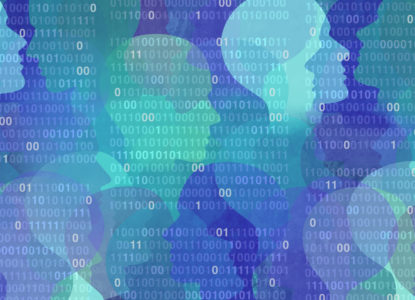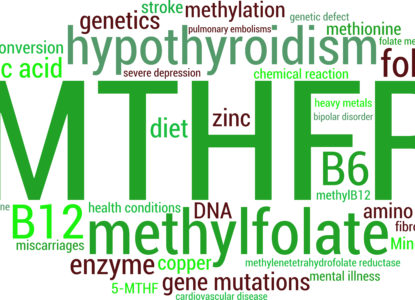5 Reasons You Can’t Sleep (And How To Fix Each One)
Article at a Glance
- Humans are meant to operate on a circadian rhythm, the ebb and flow of day and night signals to our bodies when it is time to sleep.
- The modern world, and especially blue light technology like TVs, laptops and smart phones, disrupt this rhythm by preventing the metabolism of melatonin, the sleep hormone.
- Certain genetic polymorphisms in genes like ADORA2A and CYP1A2 impact the way we respond to caffeine, which in turn affects sleep.
- Magnesium deficiency can have negative implications for good sleep.
- Seasonal allergies affect neurotransmitter levels in the brain which can also be disruptive of good sleep.
Genes Mentioned

Contents
It seems like everyone is having trouble sleeping these days, which is a problem, because if there is one basic thing we can all do to improve energy and focus throughout the day, it’s get good sleep at night.
Emerging research teaches us that a lack of sleep, which the CDC defines as less than 7 hours a night for adults over 18, is at least partially to blame for a host of chronic health issues, such as increased risk for certain kinds of cancer as well as hypertension. John’s Hopkins researcher Patrick Finan even claims that poor sleep can increase the risk for heart disease and suppress the satiety hormone ghrelin, which is the signal to the body that it’s had enough food.
So, yes, sleep is a health issue that deserves to be front and center in every wellness discussion.
Why are so many of us having trouble sleeping? What is it about the modern world that has everyone talking about getting enough sleep?
Below, I share 5 common reasons you’re not falling asleep and what to do about each one.
1. Too much caffeine hurts sleep
Primary factor: genetic
Let’s begin with some very basic biochemistry. ATP, or adenosine triphosphate, is the energy currency of the body, it is the literally gasoline for our cells. When we’ve burned up our supply of ATP for the day, levels of adenosine, a molecule that triggers sleep, rise making us drowsy and signaling it’s time for bed. When adenosine reaches high enough levels, we’re ready for sleep. However, caffeine keeps us awake by blocking the adenosine receptors, which is why many people have a tough time falling asleep after a cup of coffee.
The levels of adenosine in our body, as well as the speed with which we metabolize caffeine, are both influenced by genetics. Some people can consume caffeine past noon with no issues, while others lay in bed staring at the ceiling.
Are you a slow metabolizer of caffeine?
Caffeine is metabolized in the liver by cytochrome P450 enzymes. Due to changes in cytochrome P450 enzyme activity, some of us have greater ability to metabolize caffeine than others. This is why you may have learned through a 23andme testy, or by analyzing raw data through a third party website like this one, that you are either a “fast” or slow” metabolizer of caffeine. Changes in the CYP1A2 gene largely drive these classifications, so if you’re having trouble sleeping a simple genetic test could help explain why. The impact of caffeine on slow metabolizers can be so dramatic as to increase their risk for a heart attack by as much as 36% when consuming caffeine, according to one study. Of course CYP1A2 isn’t the only genetic marker that shapes our response to caffeine.
For example, the “C” allele of the ADORA2A gene is associated with caffeine induced insomnia, which makes sense because ADORA2A is responsible for making an adenosine receptor protein. Similarly, other genetic markers (the CYP1A2 gene in particular) are associated with slower caffeine metabolism, which means the effects of caffeine will be felt in some people for much longer than others.
Nearly half the population carries at least one copy of the “C” allele of ADORA2A which means many of us are simply not genetically suited to drinking caffeine and the effect is chronic lack of sleep.
Solution: If you can’t sleep, have your genetics tested, or just cut out the caffeine altogether and see what happens to the quality of your ZZZs. However, a word of caution: if you do decide to go cold turkey on coffee, watch out for caffeine withdrawal symptoms, I can attest first hand that they’re no joke.
2. Late night computer work hurts sleep
Primary factor: lifestyle
Humans are meant to operate on what is known as a circadian rhythm, which means we are awake when it is light out and winding down and sleeping when it is dark. The paleo diet is popular way of eating, with many advocates claiming it aligns with our ancestral roots, but what about the way our ancestors experienced light?
They certainly didn’t have light bulbs and gadgets to entertain them in their caves.
Just as ATP and adenosine ebb and flow based on the cycle of the day, so to do cortisol and melatonin, the wake and sleep hormones. Cortisol gets a bad rap as the “stress hormone,” but our body’s need cortisol to get up and going and take on the world for the day. It’s for this reason that cortisol levels are naturally at their highest in the mornings. However, as the day progresses and evening begins to bloom, melatonin slowly starts to rise so that we can go to sleep once it’s dark outside. The natural rise of melatonin as the sun sets is a key factor in helping us get to sleep.
But perhaps nothing disrupts this natural circadian balance more than the blue light we are constantly looking at on the screens of our TVs, smart phones and lap tops. The first studies looking at blue light and circadian rhythm were actually done in plankton, where the rhythms of these marine creatures were dramatically altered by blue light waves, but not light waves from different parts of the spectrum. Scientists initially believed that the human circadian clock couldn’t be influenced by light, but that view has changed over the last two decades. It is now an accepted scientific fact that blue light blocks melatonin which reduces quality of sleep. Sadly, some research has even linked working the graveyard shift, characterized by exposure to blue light and a disrupted circadian rhythm, to increased cancer risk, but the connection hasn’t yet been definitively proven.
For more, see The Unique Human Health Effects of Blue Light
Solution: try to avoid blue light exposure at least 4 hours before going to bed, or wear a pair of blue light blocking glasses if you must do late night work. Get the TV and phone out of your bedroom and designate the area as a sleep only zone. Change out LED lights (which emit large amounts of blue light) for incandescent bulbs.
3. Nutrient deficiency and poor sleep
Primary factor: lifestyle
Of course, this win’t be a factor for everyone, but nutrient deficiency can play a role in our ability to get a good night’s sleep. This is especially true for nutrients that Americans are chronically deficient in like magnesium, Vitamin D and the B vitamins.
Magnesium
In a double blind, placebo controlled study, magnesium supplements improved insomnia and sleep quality in a group of older adults. Sleep time was increased while serum levels of cortisol were decreased by taking 500 mg of magnesium daily for 8 weeks.
Vitamin D
Vitamin D has gotten a lot of attention lately because of the role it plays in the immune system of the lungs and for its potential to prevent or lessen the severity of respiratory infection. However, there is also evidence that Vitamin D plays a role in how we sleep. A 2018 meta-analysis found that Vitamin D deficiency was associated with short sleep duration and poor sleep quality.
There is also some anecdotal evidence that B vitamin deficiencies may reduce sleep quality as well.
Solution: the solution here is simple: work with your physician to get your Vitamin D and magnesium levels tested, and explore the possibility of working with a nutrigenomics lab to determine if any deficiencies are due to genetic predispositions.
4. Not knowing your sleep chronotype
Primary factor: genetic
What is a sleep chronotype? Your sleep chronotype is essentially a genetically determined circadian rhythm. Scientific research from some of our best medical journals, including this huge study from the Journal Nature, is teaching us that we aren’t all programmed to work and sleep at the same times. Instead, most people fit into one of a handful of ideal chronotypes which can offer guidance about how to set your schedule to maximize rest and productivity. In the Gene Food scoring matrix, we divide customers into one of three sleep chronotypes:
- Morning Lark (early to bed early to rise)
- Hummingbird (middle of the road)
- Night Owl (most productive at night, needs to sleep in)
Solution: So, if you’re having trouble sleeping the way you want to, it could be worthwhile to get tested and find out what your genetics have to say about the right time to head off to bed.
5. Not enough bright light and time outdoors
Primary factor: lifefstyle
I started out really wanting to have this section be devoted to exercise, as I know that getting out and moving has a big impact on my sleep quality. However, when I read the studies, it’s a mixed bag. Some studies claim that getting good sleep is a motivating factor for exercise rather than exercise contributing to sleep. For example, this study in the Journal of Clinical Sleep Medicine which found “results suggest that sleep influences next day exercise rather than exercise influencing sleep.” When they have been shown to work, exercise regimens are most effective for improving sleep quality, not as a quick fix, but over the period of about 4 months when they are consistently applied.
But maybe it’s not just the physical movement of exercise that helps us sleep, maybe it’s the exposure to light. We have already established that too much light, especially blue light at night, isn’t helpful for sleep. Checking your phone right before bed is a recipe for disaster because the blue light blocks melatonin production and signals to your body that it’s time to head off to work, not to hit the sack.
However, bright light in the early morning appears to have the opposite effect by helping to regulate the circadian rhythm. In fact, bright light therapy has been used with some promise to help treat people suffering from insomnia. For example, this study, which found early morning light therapy combined with better sleep hygiene more effective at treating insomnia than either early morning or late afternoon exercise.
For more reading on light therapy and sleep, see:
The use of Light Therapy in the Treatment of Insomnia, and;
Therapeutics for Circadian Rhythm Sleep Disorders
Solution: As a practical matter, I think this one can be accomplished by getting out of the house and getting some good quality early morning sun without sun glasses. For those of you who live in northern climates and can’t get good sun during the winter, it may be worthwhile discussing light therapy with your doctor.
Conclusion
Today’s tech obsessed world is conspiring at every turn to disrupt our sleep patterns, however, as we’ve learned, keeping a focus on the mechanism behind a healthy circadian rhythm, as well as maintaining good sleep hygiene can go a long way to fixing most sleep problems. Perhaps the biggest change most of us can make for better sleep is to focus on getting good, bright light in the mornings (sans coffee) and avoiding blue light hours before we want to go to bed at night. That, and a little magnesium and you’ll be on your way to meet the sand man.
Did you try any of the tips listed in this article? How did they work for you?



